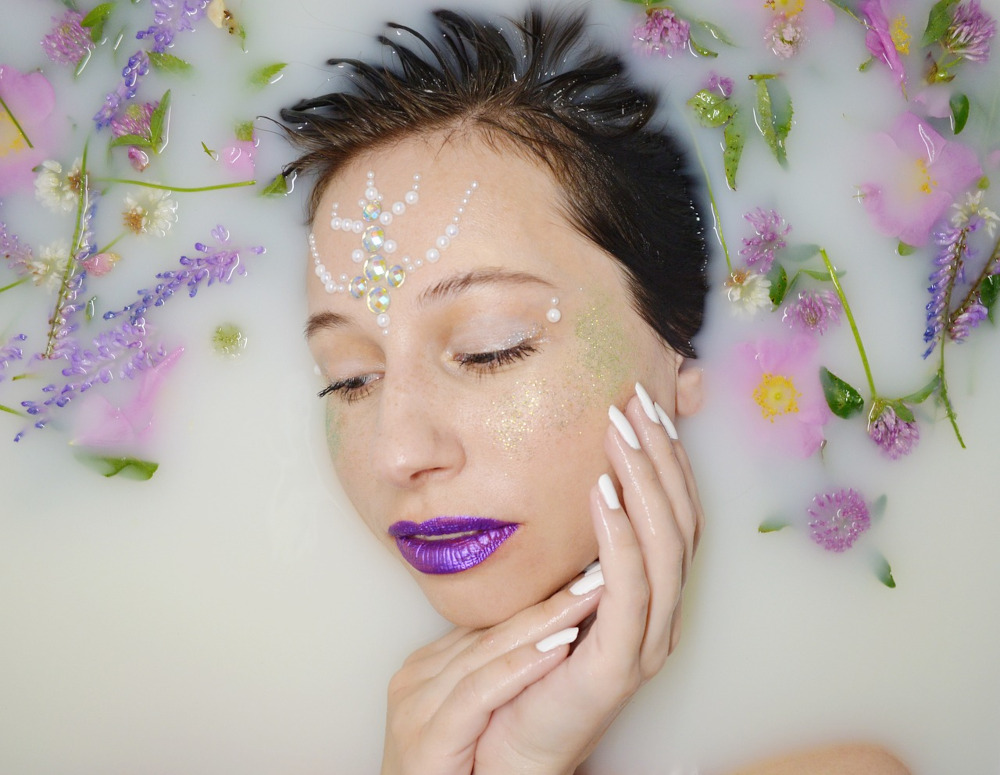Aromatic Bath for Stress & Anxiety

Stress and anxiety have been shown to cause or worsen cardiovascular disease and obesity. Fortunately, both can be treated without expensive, side-effect laden drugs. One of these treatments is not just simple and inexpensive, but relaxing and enjoyable: The aromatic bath.
The Water Cure
The therapeutic use of water is older than history. It can be found in the myths of the gods of early civilization, as well as the parchments of the Greek philosopher/physician Hippocrates. Hippocrates and other physicians of antiquity taught the use of specific baths of various temperatures, herbs and/or minerals as treatments for many diseases.
“In Greek Medicine, there evolved a healing tradition called the Water Cure. The Water Cure is the common term for a collection of therapies which, in one way or another, make skillful and ingenious use of the healing virtues of [water].”1
An aromatic bath is a form of balneotherapy. In ancient times, such a bath was created with pulverized herbs in a thermal spring or heated water. Today, we are fortunate to have those herbs readily available in the form of their primary active ingredient: essential oils.
The use of Essential Oils
Whether elevating the spirits, encouraging relaxation, increasing mental attention, or soothing sore muscles, essential oil-based bath products are often formulated in accordance with tenets of homeopathy and/or various other herbal medicine traditions. But you needn't purchase a packaged product if you enjoy the exercise of making your own. You can even use "straight" essential oils to great effect.
There are, at least, four ways to use essential oils in the bath:
- Add undiluted essential oils to bathwater. This gives the bath a wonderful aroma and you the therapeutic values of whichever oils you have chosen.
- Combine essential oils with homemade bath crystals, bath oils, and bubble baths.
- Pre-bath body oils. These are applied to the body before to getting in the bath. Pre-bath body oils have an enormously pleasing effect as the body is enveloped in an oil that is heated by water and absorbed into the body by osmosis.
- Use non-dispersible oils as the base for the essential oils you add to the bath so that they float on the water and cling to your body when you get out.
When using undiluted essential oils in the bath:
Start by running a very warm bath and when the tub is 2/3's full add a maximum of 24 drops to the water, close the door so the vapors don't escape, and finish filling the tub.
For calming down after a long day, we recommend 6 drops of Lavender, 5 drops Petitgrain, 5 drops Clary Sage, and 4 drops Pine.
For a good night's sleep, we recommend 8 drops Coriander, 6 drops Lavender, 4 drops Marjoram, and 4 drops Chamomile. This bath should take place as close to bedtime as possible, as it is VERY relaxing and effective.
Pre-Bath Body Oils:
This method is particularly useful for the treatment of arthritis, particularly rheumatoid arthritis. This recipe should be applied all over your body before stepping into the bath. FYI, this method does not have the same effect in a shower.
Pre-Bath Base Oil
(Good for oily, normal and dry skin)
- Grapeseed oil 2 TBs
- Jojoba 20 drops
- Evening Primrose oil 10 drops
- Carrot 5 drops
Stress Release Pre-Bath Oil
(Add this combination to the base oil)
- Petitgrain 15 drops
- Lavender 10 drops
- Coriander 8 drops
Non-Dispersible Oils Recipe:
You can use, as a base, any oils with the exception of Red Turkey Castor Oil, which completely disperses in water. Just remember, use no more than 15 drops essential oils per tablespoon base oils.
The following bath oil recipe not only helps to release stress it also improves the look of aging skin.
- 2 Tbs Apricot Kernel oil
- 2 tsp Avocado oil
- Lavender 10 drops
- Marjoram 8 drops
- Coriander 8 drops
- Orange 6 drops
Mix the ingredients well before adding to bathwater.
Hippocrates wrote,
"The way to health is to have an aromatic bath or scented massage every day."
Modern science has proven the mind and body are inextricably connected. It is now certain that the sense of smell can affect our moods, and therefore our thoughts; so, the benefits of an aromatic bath cannot be denied.
How often one should engage in this curative indulgence is entirely up to the individual. Those living high-stress lifestyles would do well to indulge as often as possible.
Love what you’re reading? Don’t miss out on future articles! Subscribe for updates on our latest posts and our bi-monthly newsletter.
Sign up now—no spam, just good vibes and holistic health insights delivered straight to your inbox!
1 “The Water Cure”. GreekMedicine.net, n.d. Web. January 22, 2016
Worwood, Valerie Ann. The Complete Book of Essential Oils & Aromatherapy, 1991. Print
